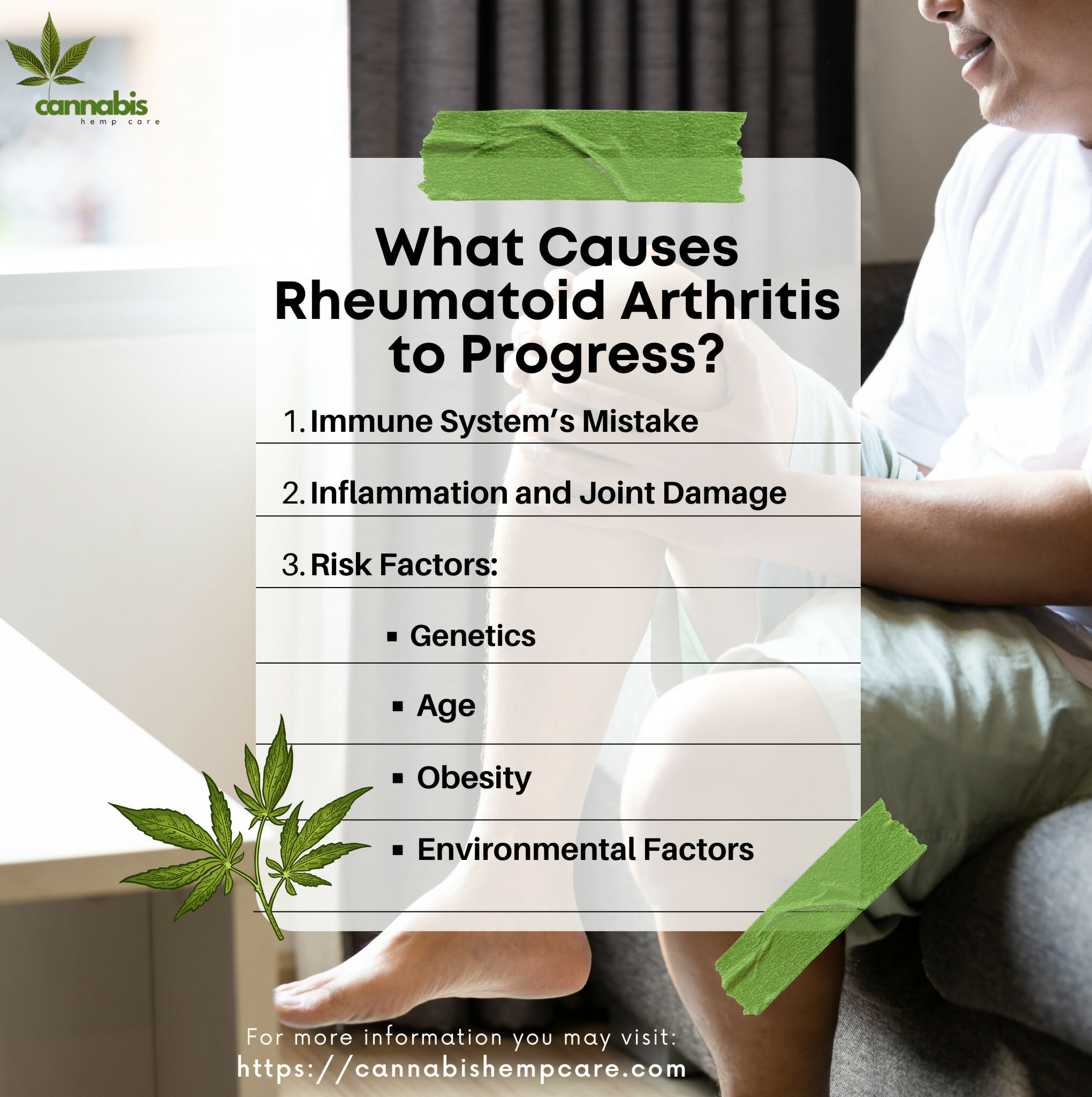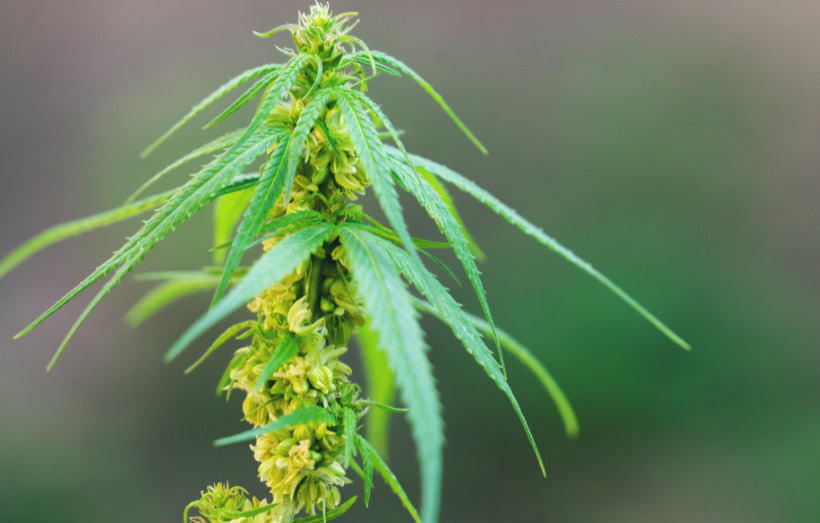Understanding Rheumatoid Arthritis (RA)
Rheumatoid arthritis is an autoimmune disorder that mainly affects your joints, causing swelling, stiffness, pain, and potential damage. RA can be a lifelong condition, and although there is no cure for it, there are ways to manage the symptoms and slow its progression.
What Causes RA to Progress?
Let’s break down what causes the progression of Rheumatoid Arthritis (RA) in simple terms:

- Immune System’s Mistake: In RA, the immune system (which usually fights off harmful invaders like viruses and bacteria) gets confused and starts attacking the body’s own healthy tissues. This is similar to a friendly-fire situation where soldiers mistakenly attack their own side.
- Inflammation and Joint Damage: This mistaken attack by the immune system causes inflammation (swelling, redness, and pain) in the joints. Over time, this ongoing inflammation can damage the joints, making them stiff and deformed. This is like a prolonged battle in the joints that causes wear and tear on the battlefield.
- Risk Factors: There are certain factors that can increase the chances of RA getting worse:
- Genetics: Just like you inherit your eye color from your parents, you can also inherit genes that make you more likely to have RA. It’s like a family history of being prone to this condition.
- Age: RA can happen at any age, but it’s more common as you get older. It’s like a car that’s more likely to have problems as it gets older.
- Obesity: Being overweight can put extra stress on your joints, making RA symptoms worse. Imagine carrying a heavy backpack all the time – it would make your back and shoulders hurt more.
- Environmental Factors: Smoking is one example of an environmental factor that can make RA progress faster. It’s like pouring gasoline on a fire – it makes the situation worse.
RA progression happens when the immune system mistakenly attacks healthy joints, causing ongoing inflammation and damage. Certain factors like genetics, age, obesity, and smoking can make this process go faster.

How Can You Prevent RA from Progressing?
- Early Diagnosis and Treatment: Studies have shown that early diagnosis and treatment can slow down or even halt the progression of RA. According to a study published in Arthritis Research & Therapy, early diagnosis and aggressive treatment can significantly improve long-term outcomes for RA patients.
- Medications: Taking the right medications as prescribed is crucial in managing RA. Biologics, DMARDs, and NSAIDs are some of the drugs used to reduce inflammation and slow the progression of RA. A report from the American College of Rheumatology recommends taking these medications regularly, as they can help prevent joint damage.
- Lifestyle Changes: Making some lifestyle changes can have a huge impact on slowing the progression of RA. Regular exercise can strengthen muscles and support affected joints while maintaining a healthy weight can reduce stress on joints. Physical therapy can be helpful in improving flexibility and range of motion.
- Quit Smoking: If you are a smoker, quitting can significantly slow the progression of RA. Research published in the Rheumatology Journal has found that smoking can accelerate the progression of RA and increase the severity of symptoms.
- Manage Stress: High levels of stress can trigger RA flare-ups and exacerbate symptoms. According to a study published in Brain, Behavior, and Immunity, stress can increase inflammation in the body, making RA symptoms worse.

What Role Does Diet Play in Managing RA?
Let’s talk about the role of diet in managing Rheumatoid Arthritis (RA) in simpler terms:
1. Managing Inflammation: Just like you need to keep a campfire from getting too big, managing inflammation in your body is important with RA. Inflammation is like the body’s way of fighting off trouble, but sometimes it gets too active and causes problems. Eating the right foods can help keep this inflammation under control.
2. Good Food Choices: Imagine your body as a car engine – it needs the right fuel to run smoothly. Eating a balanced diet is like giving your body the right fuel. Fruits, veggies, whole grains, and lean proteins are the best kind of fuel for your body. They can help calm down the inflammation and make your joints feel better.
3. Omega-3 Superheroes: Think of omega-3 fatty acids as little superheroes that fight off inflammation. They’re found in foods like fatty fish (like salmon) and flaxseeds. These superheroes can help keep the inflammation from going overboard.
4. Not-So-Great Foods: Just like junk food isn’t great for your body overall, it’s not great for RA either. Foods high in salt, sugar, and processed stuff can make the inflammation worse. It’s like adding more wood to a campfire – it makes it burn hotter.
5. Hydration Matters: Staying hydrated is like giving your body a cool drink when it’s thirsty. It helps your joints work better and reduces inflammation too. Think of it as giving your body a refreshing splash.
6. Listen to Your Body: Your body is like a detective – it knows when something doesn’t feel right. Pay attention to how you feel after eating certain foods. If something makes your joints ache more, it might be best to cut back on it.
Eating a balanced diet with lots of colorful fruits, veggies, and good protein can help calm down the inflammation in your body. Omega-3s are like little anti-inflammatory superheroes, while salty, sugary, and processed foods can make the inflammation worse. Just like taking care of a campfire, taking care of your body with the right food can keep things running smoothly.

Conclusion
When you have an RA flare-up, it’s essential to listen to your body. Rest, modify your activities, and consider using assistive devices to reduce stress on your joints. If the flare-up is severe, it’s essential to consult your healthcare provider.
Remember, managing RA is a lifelong commitment. It’s crucial to work with your healthcare team and make the necessary lifestyle changes to slow down its progression and live a fulfilling life.
FAQs
How can I naturally slow down rheumatoid arthritis?
Focus on a balanced diet, regular exercise, stress management, and adequate sleep. These lifestyle factors can help manage symptoms and slow progression.
Can you prevent rheumatoid arthritis from getting worse?
While there’s no cure, early diagnosis, medication, healthy habits, and medical guidance can effectively manage symptoms and slow down its progression.
What vitamins help rheumatoid arthritis?
Vitamins like vitamin D, omega-3 fatty acids, and antioxidants (vitamin C and E) may support joint health. Consult your doctor before adding supplements to your routine.
What triggers rheumatoid arthritis?
Genetic factors, hormonal changes, and environmental factors like smoking and certain infections can contribute to the development and progression of rheumatoid arthritis.
What activities worsen rheumatoid arthritis?
High-impact activities, excessive repetitive motions, and poor posture can exacerbate RA symptoms. Consult a healthcare professional for guidance on appropriate exercises and movements.




































